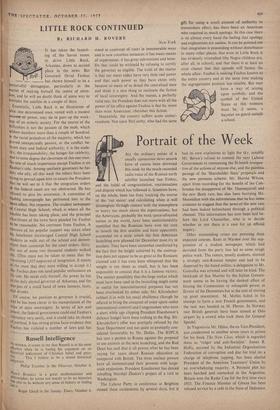LITTLE ROCK CONTINUED
By RICHARD H. ROVERE New York IT has taken the launch- ing of the Soviet moon to drive Little Rock, Arkansas, down to second place in the news. But Governor Orval Faubus
— has shown himself to be a resourceful demagogue, particularly in the iiiatter of making himself the centre of atten- tion, and he will no doubt .think of some way to overtake the satellite in a .couple of days: Essentially, Little Rock is an illustration of what one determined man, vested with a modest amount- of power, may do to gum up the work- 111.gs. of an orderly society. For the source of the difficulties is not the passion of the mob, which *Worn numbers more than a couple of hundred, Or the racial prejudices of the majority, which has Proved unexpectedly passive, or the conflict be- een state and federal authority; it is the auda- city, the irresponsibility, the hunger for celebrity, and to some degree the cleverness of this one man. No one of much importance except Faubus is on Faubus's side. Among southern governors hehas Only one ally; all this week the others have been trying to prevail upon him to assure the President that he will see to it that the integration orders of the federal court are not obstructed. He has refused to give his assurance. A committee of leading townspeople has petitioned him to the 3ame- effect. No response. The student newspaper of Central High School, which is where all the trouble has been taking place, and the principal churchmen of the town have pleaded for Faubus le be reasonable. No comment from Faubus. A ot.easure of his popular support was taken when his henchmen encouraged Central High School students to walk out of the school and demon- strate their contempt for the court orders. Sixty- l1\ e out of some two thousand students walked °Lit. (This must not be taken to mean that the remaining 1,935 approved of integration. It means at the most that they were willing to accept it.) lUt Faubus does not need popular enthusiasm on Ins side. He needs only himself, the power he has as the duly elected governor of Arkansas, and the energies of a small band of town !coneys, louts, and drunks.
Of course, his position as governor is crucial, ‘.10el he has been clever in his manipulation of the issue of state sovereignty. In terms of law and Power, the federal government could end Faubus's resistance very easily, and it could take its choice Of method. It has strong prima facie evidence that Faubus has violated a number of laws and has
stood in contempt of court in innumerable ways and in now countless instances; it has many means of suppression; it has great subventions and bene- fits that could be withheld by refusing to certify the governor as eligible. The truth of the matter is that our states today have very little real power and that such power as they have exists only because so many of us dread the centralised state and think it a nice thing to maintain the fiction of local sovereignty. And the reason, a perfectly valid one, the President does not move with all the power of his office against Faubus is that he, more than most Americans, cherishes this fiction.
Meanwhile, the country suffers acute embar- rassment. Not since McCarthy, who had the same gift for using a small amount of authority to tremendous effect, has there been an American who required as much apology. In this case there is on almost every hand the feeling that apology and explanation are useless. It can be pointed out that integration is proceeding without disturbance in many other places, that even in Little Rock it has evidently triumphed (the Negro children are, after all, in school), and that there is at least an even chance that this episode will hasten the whole affair. Faubus is making Faubus known to the entire country and at the same time making the segregationist position less tenable. But men have .a way of seizing upon symbols, and the symbol of the United States at this moment must be, it seems, a bayonet on guard outside a school.


































 Previous page
Previous page